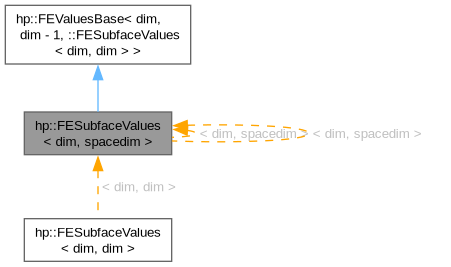 |
Reference documentation for deal.II version 9.6.0
|
 |
Reference documentation for deal.II version 9.6.0
|
#include <deal.II/hp/fe_values.h>

Public Member Functions | |
| FESubfaceValues (const hp::MappingCollection< dim, spacedim > &mapping_collection, const hp::FECollection< dim, spacedim > &fe_collection, const hp::QCollection< dim - 1 > &q_collection, const UpdateFlags update_flags) | |
| FESubfaceValues (const hp::FECollection< dim, spacedim > &fe_collection, const hp::QCollection< dim - 1 > &q_collection, const UpdateFlags update_flags) | |
| template<bool lda> | |
| void | reinit (const TriaIterator< DoFCellAccessor< dim, spacedim, lda > > &cell, const unsigned int face_no, const unsigned int subface_no, const unsigned int q_index=numbers::invalid_unsigned_int, const unsigned int mapping_index=numbers::invalid_unsigned_int, const unsigned int fe_index=numbers::invalid_unsigned_int) |
| void | reinit (const typename Triangulation< dim, spacedim >::cell_iterator &cell, const unsigned int face_no, const unsigned int subface_no, const unsigned int q_index=numbers::invalid_unsigned_int, const unsigned int mapping_index=numbers::invalid_unsigned_int, const unsigned int fe_index=numbers::invalid_unsigned_int) |
This class implements for subfaces what hp::FEFaceValues does for faces. See there for further documentation.
Definition at line 596 of file fe_values.h.
| FESubfaceValues< dim, spacedim >::FESubfaceValues | ( | const hp::MappingCollection< dim, spacedim > & | mapping_collection, |
| const hp::FECollection< dim, spacedim > & | fe_collection, | ||
| const hp::QCollection< dim - 1 > & | q_collection, | ||
| const UpdateFlags | update_flags ) |
Constructor. Initialize this object with the given parameters.
Definition at line 535 of file fe_values.cc.
| FESubfaceValues< dim, spacedim >::FESubfaceValues | ( | const hp::FECollection< dim, spacedim > & | fe_collection, |
| const hp::QCollection< dim - 1 > & | q_collection, | ||
| const UpdateFlags | update_flags ) |
Constructor. This constructor is equivalent to the other one except that it makes the object use a Q_1 mapping (i.e., an object of type MappingQ(1)) implicitly.
Definition at line 549 of file fe_values.cc.
| void FESubfaceValues< dim, spacedim >::reinit | ( | const TriaIterator< DoFCellAccessor< dim, spacedim, lda > > & | cell, |
| const unsigned int | face_no, | ||
| const unsigned int | subface_no, | ||
| const unsigned int | q_index = numbers::invalid_unsigned_int, | ||
| const unsigned int | mapping_index = numbers::invalid_unsigned_int, | ||
| const unsigned int | fe_index = numbers::invalid_unsigned_int ) |
Reinitialize the object for the given cell, face, and subface.
After the call, you can get an FESubfaceValues object using the get_present_fe_values() function that corresponds to the present cell. For this FESubfaceValues object, we use the additional arguments described below to determine which finite element, mapping, and quadrature formula to use. They are order in such a way that the arguments one may want to change most frequently come first. The rules for these arguments are as follows:
If the q_index argument is left at its default value, then we use that quadrature formula within the hp::QCollection passed to the constructor of this class with index given by cell->active_fe_index(), i.e. the same index as that of the finite element. In this case, there should be a corresponding quadrature formula for each finite element in the hp::FECollection. As a special case, if the quadrature collection contains only a single element (a frequent case if one wants to use the same quadrature object for all finite elements in an hp-discretization, even if that may not be the most efficient), then this single quadrature is used unless a different value for this argument is specified. On the other hand, if a value is given for this argument, it overrides the choice of cell->active_fe_index() or the choice for the single quadrature.
If the mapping_index argument is left at its default value, then we use that mapping object within the hp::MappingCollection passed to the constructor of this class with index given by cell->active_fe_index(), i.e. the same index as that of the finite element. As above, if the mapping collection contains only a single element (a frequent case if one wants to use a Q_1 mapping for all finite elements in an hp-discretization), then this single mapping is used unless a different value for this argument is specified.
Definition at line 563 of file fe_values.cc.
| void FESubfaceValues< dim, spacedim >::reinit | ( | const typename Triangulation< dim, spacedim >::cell_iterator & | cell, |
| const unsigned int | face_no, | ||
| const unsigned int | subface_no, | ||
| const unsigned int | q_index = numbers::invalid_unsigned_int, | ||
| const unsigned int | mapping_index = numbers::invalid_unsigned_int, | ||
| const unsigned int | fe_index = numbers::invalid_unsigned_int ) |
Like the previous function, but for non-DoFHandler iterators. The reason this function exists is so that one can use this class for Triangulation objects too.
Since cell->active_fe_index() doesn't make sense for Triangulation iterators, this function chooses the zero-th finite element, mapping, and quadrature object from the relevant constructions passed to the constructor of this object. The only exception is if you specify a value different from the default value for any of these last three arguments.
Definition at line 608 of file fe_values.cc.